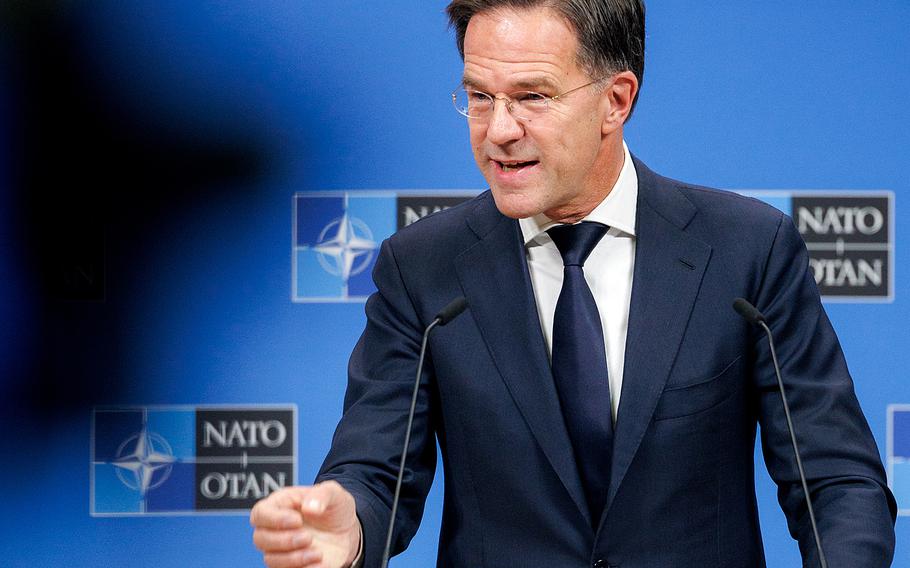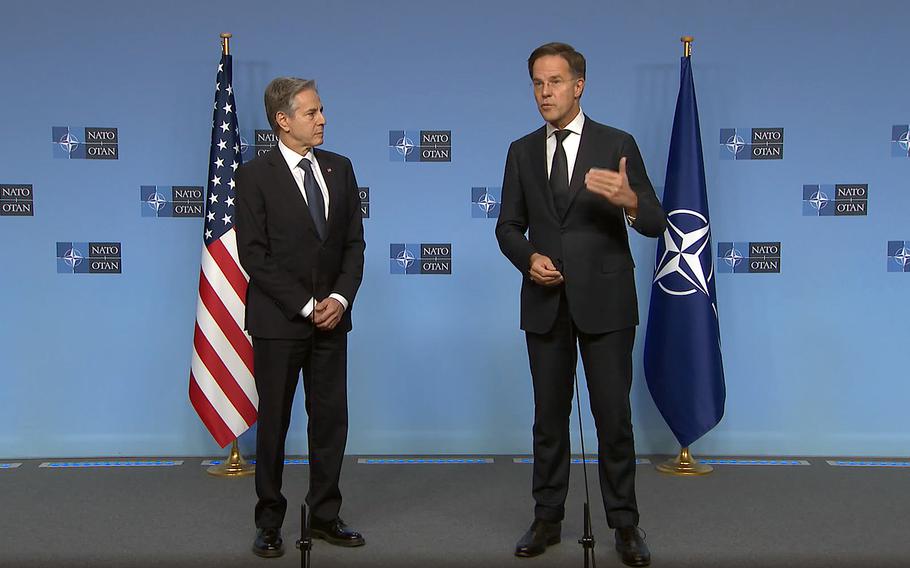
NATO Secretary-General Mark Rutte addresses reporters Dec. 3, 2024, ahead of meetings of the alliance's foreign ministers in Brussels. (NATO)
The battlefield backing that Russia is getting from North Korea, China and Iran in Ukraine has strings attached that could threaten the American homeland, NATO’s top official said Tuesday.
For example, the Kremlin is “no doubt” providing Pyongyang with missile technology in exchange for North Korean troops, Secretary-General Mark Rutte said as high-level talks got underway at alliance headquarters.
That technology could be used against both South Korea and the U.S. mainland, Rutte said, adding that Beijing and Tehran are benefiting in a similar manner.
“This is all getting connected,” Rutte said. “So whenever we get to a deal on Ukraine, it has to be a good deal.”
A one-sided deal in Russia’s favor would embolden adversaries, according to Rutte, who was in Florida last month to meet with President-elect Donald Trump.
Rutte said Tuesday that he had conveyed his view of the global security stakes of the Russia-Ukraine war. The talks came amid concerns about the durability of American support for Ukraine.
At NATO headquarters in Brussels, outgoing U.S. Secretary of State Antony Blinken will be on hand to talk up recent pledges by Washington to surge weapons deliveries into Ukraine as President Joe Biden’s administration heads into its final month.
But questions remain about how the incoming administration will proceed. Trump has long expressed opposition to arming Ukraine and has pledged to bring the war to a quick end.

Secretary of State Antony Blinken listens to NATO Secretary-General Mark Rutte ahead of a two-day meeting of the alliance's foreign ministers in Brussels. It is the last such scheduled NATO gathering involving Blinken and the Biden administration. (NATO)
It’s unclear what the terms of a peace deal could look like, though any agreement would likely involve concessions by Kyiv.
Ukrainian President Volodymyr Zelenskyy told British media outlet Sky News on Friday that he would be willing to cease fighting and pursue the reclamation of occupied territory through diplomatic channels. Ukraine in return would receive a NATO security guarantee, without which Zelenskyy said Ukraine would be at risk of being reinvaded.
Other plans reportedly being considered by the Trump team call for an international European peacekeeping force to occupy a demilitarized zone that would see Russia holding on to Ukrainian territory currently under its control.
Last week, Trump announced that his special envoy to Ukraine will be Keith Kellogg, a retired Army general who has said the United States’ willingness to provide military aid should be contingent on Ukrainian participation in peace talks.
And if Moscow refuses to negotiate an end to the war, Washington should ramp up military support to Ukraine, Kellogg wrote in a May research report for the America First Policy Institute, a think tank created to advance Trump’s policies.
But Rutte said there are no signs that Russian President Vladimir Putin is ready to discuss peace. In recent months, his forces have made incremental territorial gains while Ukraine has struggled with manpower shortages.
“Russia’s aggression shows no sign of abating,” Rutte said. “Just the opposite. Putin is ramping up his rhetoric and reckless actions.”
The way forward for NATO centers on digging into already strained weapons stockpiles to deliver more support, Rutte said.
During his talks with Trump, the need for allied military spending to exceed NATO’s current benchmark of 2% of gross domestic product was one major topic of discussion, Rutte said.
Another centered on the need for allies to ramp up a defense industrial base to keep pace with the demands of the war in Ukraine, he said.
“The stronger our military support to Ukraine is now, the stronger their hands will be at the negotiating table,” Rutte said. “And the sooner we can end Russian aggression once and for all in Ukraine.”